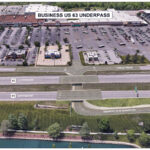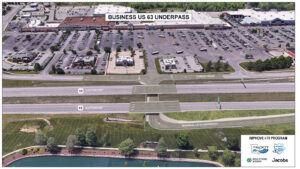Raised caps on the cost of business licenses caught Columbia enterprises off guard.
Cities have long required companies conducting commerce there to purchase a business license. Municipal governments assess the cost of those licenses in various ways, ranging from flat fees to using number of employees, industry type, or square footage of the company facility. Among the most popular methods is the use of gross receipts, and that’s what the city of Columbia has been using for decades.
In the late 1970s, the City Council mandated a rate of 25 cents per $1,000 in gross receipts to calculate the cost of a business license. There was a cap of $750 which reflects only the company’s first $3 million in gross revenue. The ordinance remained basically unchanged until 2022, when the City Council amended it to increase the cap to $3,000, although the basic rate remained the same.
That brings us to the council’s amendment in December 2023 to gradually increase the $3,000 cap to $50,000 by fiscal year 2029, which begins Oct. 1, 2028. By then, businesses that earn $200 million or more in gross receipts will be required to pay the maximum for their annual business license.
The amended business license ordinance also raised the processing fee for first-time applications from $25 to $45. Processing an annual renewal comes with a new $25 fee in addition to the assessed license fee. The minimum cost for an annual license is $75, which includes all businesses with $300,000 or less in gross receipts. The cap this year is $10,000, assessed to companies with $40 million or more.
Still, the rate used to calculate the license, 25 cents per $1,000 in gross receipts, remains the same after more than 40 years.
When license renewal notices were mailed to Columbia businesses in May 2024, a lot of owners were caught off guard by the increased cost. Some only had to pay the new $25 processing fee while their assessment remained the same. Others wondered how they would pay an increased cost of doing business.
It’s probably safe to say no one was elated, but some weren’t surprised. Everything is more expensive these days.
Change Is Inevitable
It costs a lot to run a business. It costs a lot to run a city that must provide services that those businesses need to thrive. Both look for ways to improve their bottom lines; a business to profit and a municipality to cover the cost of ever-increasing demands for services. It’s no wonder that the latter, when looking for ways to increase revenue, considered the cost of business licenses set more than four decades ago.
Todd Guess has served as business services manager for the city for three years, although he has been in other positions for 15. He looked at the rate structures of comparable Missouri cities, including Springfield and Independence. Overall, Columbia’s structure is less expensive, although the nuances of the other cities’ structures don’t lend themselves to apples-to-apples comparisons. While Columbia applies the assessment equally to all businesses, the comparative cities vary cost by occupation and business.
The business license fees collected by the city are earmarked for the general fund in the budget. In FY24, fees generated nearly $1.3 million. That number is expected to be roughly $1.8 million in FY25, which ends September 30, 2025. The general fund includes monies for business regulation services, such as public health, planning and zoning, and building regulations, and the cost to administer them.
Is It Grossly Unfair?
Business owners like Connie Liepard, owner of Quality Drywall Construction and a member of the Columbia Chamber of Commerce Governmental Affairs Committee, heard a lot of disgruntled comments from business owners after they received their renewal letters. Some experienced a major increase while others were less significant. But in every case, as Liepard said, those costs are passed on to customers.
Liepard said she and other business owners question whether gross receipts are a fair mechanism to use. That’s because some businesses work with very small profit margins.
“In the construction industry, our gross receipts are very high,” she said. “But you operate off a small bottom line. Your net profit on a project, after overhead, is substantially lower.”
Chamber President Matt McCormick added, “If you start looking at some of our businesses that have a 1 or 2 percent profit margin, gross revenue isn’t the end-all factor of how well their business is doing. We feel there are more equitable and responsible factors to base licensing on.”
Net income, rather than gross, might bring more parity among industries with different margins.
“I don’t have the context to know why or even whether the Columbia City Council, in 1978, considered and chose gross over net when establishing Columbia’s fee calculations,” Guess said. “I am unfamiliar with any municipality in Missouri which uses net revenue for business license fees.”
That doesn’t mean that there aren’t better or at least different mechanisms the city could consider. Guess conceded that using gross receipts is a fair way to assess licenses but may not be equitable.
“It is levied progressively and applies to every business equally,” he noted. “That said, the city services which are funded by these fees are not utilized equally by all types of businesses or occupations. I believe a more equitable way to levy these fees would be to do so with consideration given for the impact on and utilization of general fund services by different segments of businesses in our community.”
McCormick agreed that the city needs to find “a better, more sustainable solution.”
“This is something we’ve been working with the city on since we started seeing what was coming out,” McCormick says. “I think there are some unintended consequences with the ways it’s done and we’re trying to work our way through those with the city.”
Most businesses felt the impact of the increased cap. But the process contributed to the disgruntlement.
The Process Was Problematic
“I believe it’s too expensive,” Liepard said. “As a small business owner, in my opinion, I believe our city and county make decisions that have a negative impact on businesses — and they don’t even realize it.”
The surprise of the increases this year has caused the biggest controversy. And Guess takes responsibility for that.
“That’s my biggest regret and biggest failure in this entire process,” he said. “While the Finance Department did meet all the required obligations in terms of public postings, I did not conduct any public information meetings. Those aren’t required in this process but in hindsight, I definitely should have done that.”
The Chamber also highlighted the lack of a public process.
“One of our priorities at the local level is to facilitate transparent communication and engagement between local elected officials and the business community regarding policies,” McCormick said. “That’s where something like business licenses would fall.”
The good news is that those conversations have begun. At its January 6, 2025, meeting, the City Council voted to pause the fee cap increase at $10,000, pending further discussion between the Finance Department and the business community.
Guess concluded, “I am hopeful that upcoming meetings between city staff and the business community can help identify a business license fee structure which balances the need to generate revenue for the city’s general fund services with the relative demands different business types place on those services.”










